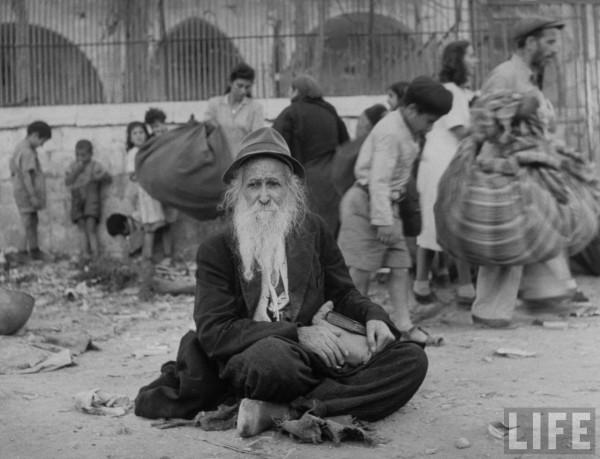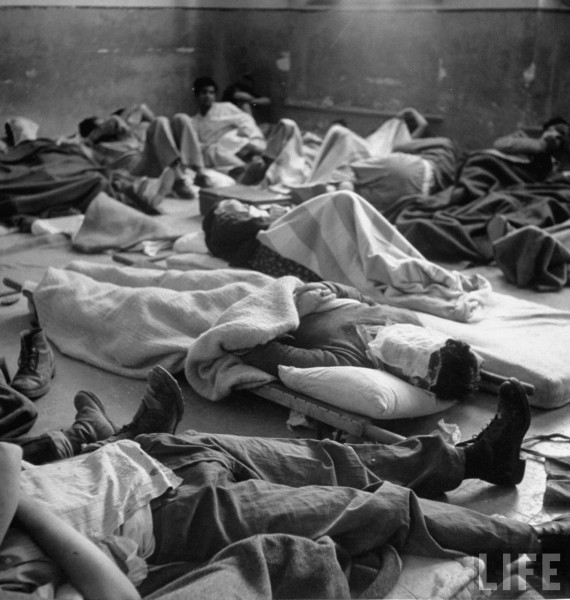As you can see, Palestinians aren't interested in treaties with the Israeli people, and actively deny their existence. However, unlike Palestinian people, Israel exists. The existence of a Palestinian people is a myth concocted for political purposes.
The Arab people possess 21 sovereign nations, more than any other people on earth, with a combined land mass of over 800 times that of Israel. So then, why invent a people? Because this is not enough for them, they feel the need to rob the Jews of their one and only country. And because people today are too distracted to learn the history of one of the world's most important places, many lies go uncontested.
The claim of the existence of a Palestinian people often comes up short when asked to provide archeological evidence. That's because there isn't any. Because of this, many so-called Palestinians claim to be of the bloodline of the Philistines and the Canaanites. This claim is unusual because Muslims have never worried about keeping an accurate bloodline, while the Jewish people's knowledge of their ancestry is extensive. Yet there is no evidence of a Palestinian people, language, history, currency, cities, or any trace of Palestinian culture. These co-called Palestinians are full-blooded Arabic, and only moved into Israel a century ago.
The Canaanites were a race of people who lived in the land of Israel before the Hebrew's exodus from Egypt. They did not claim a state, they had instead formed independently governed cities. The Canaanites were not an Arabic people! Their language was Semitic, and therefore did not need interpreters with the Hebrew people. The Canaanites, intermarried into the the Hebrews, were displaced many times throughout Israel's occupation by the Assyrians, Babylonians, Persians, Macedonians, Selucians, the Romans, and finally by the Arabs themselves in Islam's expansionist drive. Their permanent home would be Lebanon, in which they intermarried with their people. Not only are Canaanites and Lebanese not Arabic, they reject the term! Yet, the so-called Palestinians are Arabs, neither speaking Hebrew nor coming from Lebanon. Don't be fooled! Many Arabs claim that the original Canaanites were Arabs themselves, but the Scriptures claim otherwise. Scriptures also point out that the Canaanites married into the Hebrews, causing them to no longer exist. Arabic claims to be of Canaanite descent may sound scriptural to the uninitiated, but it only proves their ignorance of what Scripture really says.
The so-called Palestinians also claim to be from a race of people called the Philistines, but there is a huge problem with this claim: There was never a Philistine people! The term "Philistine" actually comes from the Hebrew term, "pelesh", meaning "invaders". The Palestinians most certainly are invaders! The invaders mentioned in the Scriptures came from Asia Minor, the Aegean Islands, and Crete. These three cultures formed a federation that was wiped out by the Greeks, and forced to settle along the Canaanite coast. This land, now called the Gaza Strip, didn't encompass the entirety of Israel, and certainly didn't include Jerusalem and Jericho. The people who lived on the modern-day Gaza Strip were certainly not Arabic. They, like the Canaanites, were reduced to insignificance by King David, and later erased from existence by Sargon II of Assyria, making it impossible for anyone alive to prove lineage to the people labeled as "Philistines", "invaders", but if any can, they must ask Greece to return the island of Crete, their only legitimate claim. To the uninitiated, the Philistines sounds like a Biblical race, but it is not a race, but an appropriate moniker for a federation of invaders, and claiming that such a group is a race, yet along that this race is the rightful owner of Israel, only proves one's scriptural ignorance. To make this comedic gold, "Philistine" is the term from which "Palestine" was derived. When one knows that "Philistine" is derived from a word meaning "invader", to claim to be one of them sounds more like a confession!
The Palestinians is a race that was completely invented to politically deprive Israel of what rightfully belongs to it. Because the Philistines and Canaanites no longer exist, they can't register a complaint when Arabic people steal their name and identity. Before 1948, there was not a trace of "Palestinian" culture anywhere in Israel, or anywhere in the world. There were no cities on "Palestinian" lands, and the land itself was completely barren. There was no culture, language, currency, or any form of human identity in "Palestine" in 1947, or for centuries before. For some reason, the land of Israel only became attractive to Arabs starting in 1948, when it became something that can be stolen from the Jewish people.
If Muslims believe in the Quran at all, here is what was written of the land of Israel well before the Palestinians existed:
"And thereafter We [Allah] said to the Children of Israel: 'Dwell securely in the Promised Land. And when the last warning will come to pass, we will gather you together in a mingled crowd'." Quran 17:104
This is the Quran's confession that Israel belongs to the Jewish people, and that the place never belonged to a race of "Palestinians". In light of this, the lie that Jerusalem is the third sacred place to Islam must be answered. This claim comes from an Islamic Hadith, in which Muhammad makes a dream flight from the furthest Mosque. In this Hadith, Jerusalem was not mentioned by name. In fact, Muhammad has never set foot in Jerusalem for as long as he lived, and he may not have even heard of the place. This is evidenced by the fact that no Islamic scriptures have mentioned Jerusalem by name! The Islamic claim to Jerusalem is completely false, as there were no mosques in Jerusalem in the year 632, when Muhammad died. At this time, Jerusalem was a Christian controlled city. Sura 17:1 makes no reference to Jerusalem, and therefore, there is no real Quranic claim to the Holy Land at all. There is an Al-Aqsa mosque in Jerusalem, that was originally the Christian Church of St. Mary, which was converted into a mosque over 70 years after Muhammad died miserably of a fever. Because this mosque wouldn't exist until well after he died, it's not possible for this building to be what Muhammad had in mind.
Ironically, the Arabic name for Jerusalem is Al-Quds, which is an abbreviation for "The Temple". Islam never had a temple, but the Jews did! Even now, the original temple built by Solomon is being systematically excavated hidden from the eyes of the press. The existence of such a temple proves that the Bible is true, and they couldn't let that little doozy get out!
If you believe that America is Israel's ally, you are wrong. The impression given by the American media to a distracted and ignorant people is that the Palestinian people were an ancient race that has been living in the Holy Land for thousands of years. News agencies like CNN and NBC have devoted countless hours of air time to the plight of this fictitious people, but spent little or no time giving the rich history of this people. That's because there isn't any. The maps of this "ancient race" given by CNN only goes back as far as 1917. The "Struggle for Middle East Peace" history timeline from CBS starts from 1897. These dates are AD. The Palestinian National Authority has a website listing off the milestones of the Palestinian people during the 20th century. This is the only historical page on the PNA's site, so they seem to acknowledge that there was no Palestine prior to the 1900s. One would get the idea that the land was completely empty.
Refusing to acknowledge Israel's existence and it's right to exist doesn't make it exist any less. For that matter, no time spent acknowledging the existence of the Palestinian people will make them exist. The Palestinians are a myth. And as their name implies, they are invaders trying to take what does not belong to them. Here are some confessions:
“Why is it that on June 4th 1967 I was a Jordanian and overnight I became a Palestinian?”
“We did not particularly mind Jordanian rule. The teaching of the destruction of Israel was a definite part of the curriculum, but we considered ourselves Jordanian until the Jews returned to Jerusalem. Then all of the sudden we were Palestinians - they removed the star from the Jordanian flag and all at once we had a Palestinian flag”.
“When I finally realized the lies and myths I was taught, it is my duty as a righteous person to speak out”
"As I lived in Palestine, everyone I knew could trace their heritage back to the original country their great grandparents came from. Everyone knew their origin was not from the Canaanites, but ironically, this is the kind of stuff our education in the Middle East included. The fact is that today's Palestinians are immigrants from the surrounding nations! I grew up well knowing the history and origins of today's Palestinians as being from Yemen, Saudi Arabia, Morocco, Christians from Greece, muslim Sherkas from Russia, muslims from Bosnia, and the Jordanians next door. My grandfather, who was a dignitary in Bethlehem, almost lost his life by Abdul Qader Al-Husseni (the leader of the Palestinian revolution) after being accused of selling land to Jews. He used to tell us that his village Beit Sahur (The Shepherds Fields) in Bethlehem County was empty before his father settled in the area with six other families. The town has now grown to 30,000 inhabitants".
-Walid Shoebat, former PLO terrorist
"There has never been a land known as Palestine governed by Palestinians. Palestinians are Arabs, indistinguishable from Jordanians (another recent invention), Syrians, Iraqis, etc. Keep in mind that the Arabs control 99.9 percent of the Middle East lands. Israel represents one-tenth of one percent of the landmass. But that's too much for the Arabs. They want it all. And that is ultimately what the fighting in Israel is about today... No matter how many land concessions the Israelis make, it will never be enough".
- Joseph Farah, Arab writer and journalist, from "Myths of the Middle East"
"There is no such country as Palestine. 'Palestine' is a term the Zionists invented. There is no Palestine in the Bible. Our country was for centuries part of Syria. 'Palestine' is alien to us. It is the Zionists who introduced it".
-Auni Bey Abdul-Hadi, Syrian Arab leader to British Peel Commission, 1937
"There is no such thing as Palestine in history, absolutely not".
-Professor Philip Hitti, Arab historian, 1946
"It is common knowledge that Palestine is nothing but Southern Syria".
-Representative of Saudi Arabia at the United Nations, 1956
"There are no differences between Jordanians, Palestinians, Syrians and Lebanese. We are all part of one nation. It is only for political reasons that we carefully underline our Palestinian identity... yes, the existence of a separate Palestinian identity serves only tactical purposes. The founding of a Palestinian state is a new tool in the continuing battle against Israel".
-Zuhair Muhsin, military commander of the PLO and member of the PLO Executive Council
"You do not represent Palestine as much as we do. Never forget this one point: There is no such thing as a Palestinian people, there is no Palestinian entity, there is only Syria. You are an integral part of the Syrian people, Palestine is an integral part of Syria. Therefore it is we, the Syrian authorities, who are the true representatives of the Palestinian people".
-Syrian dictator Hafez Assad to the PLO leader Yassir Arafat
If you claim to be a Palestinian, you are living a lie, and the above Arabs have already made the confession. As though this wasn't convincing enough, let's hear what several famous authors had to say about so-called "Palestine" before it could become something that can be stolen from Jews:
"There is not a solitary village throughout its whole extent (valley of Jezreel, Galilea); not for thirty miles in either direction... One may ride ten miles hereabouts and not see ten human beings. For the sort of solitude to make one dreary, come to Galilee... Nazareth is forlorn... Jericho lies a mouldering ruin... Bethlehem and Bethany, in their poverty and humiliation... untenanted by any living creature... A desolate country whose soil is rich enough, but is given over wholly to weeds... a silent, mournful expanse... a desolation... We never saw a human being on the whole route... Hardly a tree or shrub anywhere. Even the olive tree and the cactus, those fast friends of a worthless soil had almost deserted the country... Palestine sits in sackcloth and ashes... desolate and unlovely...".
-Mark Twain, "The Innocents Abroad", 1867
"In 1590 a 'simple English visitor' to Jerusalem wrote: 'Nothing there is to bescene but a little of the old walls, which is yet remayning and all the rest is grasse, mosse and weedes much like to a piece of rank or moist grounde'.".
-Gunner Edward Webbe, Palestine Exploration Fund, Quarterly Statement, p. 86; de Haas, History, p. 338
"The land in Palestine is lacking in people to till its fertile soil".
-British archaeologist Thomas Shaw, mid-1700s
"Palestine is a ruined and desolate land".
-Count Constantine François Volney, XVIII century French author and historian
"The Arabs themselves cannot be considered but temporary residents. They pitched their tents in its grazing fields or built their places of refuge in its ruined cities. They created nothing in it. Since they were strangers to the land, they never became its masters. The desert wind that brought them hither could one day carry them away without their leaving behind them any sign of their passage through it".
-Christians, concerning the Arabs in Palestine in the 1800s
"Then we entered the hill district, and our path lay through the clattering bed of an ancient stream, whose brawling waters have rolled away into the past, along with the fierce and turbulent race who once inhabited these savage hills. There may have been cultivation here two thousand years ago. The mountains, or huge stony mounds environing this rough path, have level ridges all the way up to their summits; on these parallel ledges there is still some verdure and soil: when water flowed here, and the country was thronged with that extraordinary population, which, according to the Sacred Histories, was crowded into the region, these mountain steps may have been gardens and vineyards, such as we see now thriving along the hills of the Rhine. Now the district is quite deserted, and you ride among what seem to be so many petrified waterfalls. We saw no animals moving among the stony brakes; scarcely even a dozen little birds in the whole course of the ride".
-William Thackeray in "From Jaffa To Jerusalem", 1844
"The country is in a considerable degree empty of inhabitants and therefore its greatest need is of a body of population".
-James Finn, British Consul in 1857
"There are many proofs, such as ancient ruins, broken aqueducts, and remains of old roads, which show that it has not always been so desolate as it seems now. In the portion of the plain between Mount Carmel and Jaffa one sees but rarely a village or other sights of human life. There are some rude mills here which are turned by the stream. A ride of half an hour more brought us to the ruins of the ancient city of Cæsarea, once a city of two hundred thousand inhabitants, and the Roman capital of Palestine, but now entirely deserted. As the sun was setting we gazed upon the desolate harbor, once filled with ships, and looked over the sea in vain for a single sail. In this once crowded mart, filled with the din of traffic, there was the silence of the desert. After our dinner we gathered in our tent as usual to talk over the incidents of the day, or the history of the locality. Yet it was sad, as I laid upon my couch at night, to listen to the moaning of the waves and to think of the desolation around us".
-B. W. Johnson, in "Young Folks in Bible Lands": Chapter IV, 1892
"The area was underpopulated and remained economically stagnant until the arrival of the first Zionist pioneers in the 1880's, who came to rebuild the Jewish land. The country had remained "The Holy Land" in the religious and historic consciousness of mankind, which associated it with the Bible and the history of the Jewish people. Jewish development of the country also attracted large numbers of other immigrants - both Jewish and Arab. The road leading from Gaza to the north was only a summer track suitable for transport by camels and carts... Houses were all of mud. No windows were anywhere to be seen... The plows used were of wood... The yields were very poor... The sanitary conditions in the village [Yabna] were horrible... Schools did not exist... The rate of infant mortality was very high... The western part, toward the sea, was almost a desert... The villages in this area were few and thinly populated. Many ruins of villages were scattered over the area, as owing to the prevalence of malaria, many villages were deserted by their inhabitants".
-The report of the British Royal Commission, 1913
Palestinians (actually Arabs) want you to believe that Palestinians have been living peacably in modern-day Israel for thousands of years. How then have they hidden themselves so cleverly from Mark Twain, Gunner Edward Webbe, Thomas Shaw, Constantine François Volney, James Finn, B. W. Johnson, the British Royal Commission, and a number Christians passing through the area? One would get the idea that there were no Palestinians living there.
Posted 12/30/2007 7:34 AM - email it
5 stars
votes 1
comments1
Give eProps or Post a Comment
--------------------------------------------------------------------------------
1 Comment browse comments: « first | ‹ prev
The Land of Israel and its uncontested Capital Jerusalem The Qur'an 17:104 - states the land belongs to the Jewish people If the historic documents, comments written by eyewitnesses and declarations by the most authoritative Arab scholars are still not enough, let us quote the most important source for Muslim Arabs:
"And thereafter we [Allah] said to the Children of Israel: 'Dwell securely in the Promised Land. And when the last warning will come to pass, we will gather you together in a mingled crowd'.".
017.104
YUSUFALI: And We said thereafter to the Children of Israel, "Dwell securely in the land (of promise)": but when the second of the warnings came to pass, We gathered you together in a mingled crowd.
PICKTHAL: And We said unto the Children of Israel after him: Dwell in the land; but when the promise of the Hereafter cometh to pass We shall bring you as a crowd gathered out of various nations.
SHAKIR: And We said to the Israelites after him: Dwell in the land: and when the promise of the next life shall come to pass, we will bring you both together in judgment. - Qur'an 17:104 -
Any sincere Muslim must recognize the Land they call "Palestine" as the Jewish Homeland, according to the book considered by Muslims to be the most sacred word and Allah's ultimate revelation.
“The birthplace of the Jewish people is the Land of Israel (Eretz Yisrael). There, a significant part of the nation's long history was enacted, of which the first thousand years are recorded in the Bible; there, its cultural, religious and national identity was formed; and there, its physical presence has been maintained through the centuries, even after the majority was forced into exile. During the many years of dispersion, the Jewish people never severed nor forgot its bond with the Land. With the establishment of the State of Israel in 1948, Jewish independence, lost two thousand years earlier, was renewed.”
If people of any nation were exiled to other country’s and than years later were able to reclaim their country, the world population as a whole would support such action and would not consider giving a piece of the country to the foreigners who are residing there, and under no circumstances would they consider parceling portions of the county to be set up as a separate State for the foreigners. Why should anyone in the world consider doing this very same action with the land of Israel which is a Jewish land for thousands of years? The Arabs living in the land of Israel have come from the surrounding Arab countries; they have no right whatsoever to any part of the land of Israel. In the past hundred years many Jews were ejected from Arab countries surrounding the land of Israel, their property taken and their homes and lands taken over. Let those Arabs who want to Claim the land of Israel as theirs go to those Arab countries and the homes and lands that the Jews were occupying. Any part of the land of Israel is not occupied territory; it is legally a Jewish land and has been for thousands of years, no Arab has any right to claim any rights to the land of Israel. The surrounding Arab countries compose of over 100 million people and millions of square miles, why do they have to bother little Israel with its territory about the size of the State of New Jersey. Maybe the world should consider giving European countries or parts to the Italians, since the Romans occupied it for many years. JERUSALEM If I forget thee, O Jerusalem,
may my right hand forget its cunning.
May my tongue cleave to the roof of my mouth,
if I do not set Jerusalem above my highest joy.
(Psalms 137:5-6) Jerusalem, the uncontested and undivided capital of Israel, is located in the heart of the country, nestled among the Judean Hills. The city's ancient stones, imbued with millennia of history, and its numerous historical sites, shrines and places of worship attest to its meaning for Jews. Jerusalem the "eternal and undivided capital" of the Jewish people, Jerusalem is -- and must remain -- the uncontested, undivided capital of Israel. Jerusalem is the only city that can prove the validity of Israeli-Jewish existence. No one should question Jewish historic claim and affinity to Jerusalem which dates back the Canaanite period (3000-1200 BCE). The re-capture of the old city in 1967 was widely seen by the Israelis as nothing less than the renewal of God's covenant with the Jews. Jerusalem represents their past and present, a source of religious and cultural continuity without which Israel's very existence could unravel. The hope of returning to Jerusalem has sustained the Jews throughout their dispersion, and centuries of exile have been unable to extinguish it.
Abraham, Isaac and Jacobs resided in the land of Israel and Jerusalem from the year 1948 from Creation (circa 1800 BCE).
King David made Jerusalem the capital of his kingdom, as well as the religious center of the Jewish people, in 1003 BCE. Some forty years later, his son Solomon built the Temple (the religious and national center of the people of Israel) and transformed the city into the prosperous capital of an empire extending from the Euphrates to Egypt.
The Babylonian king Nebuchadnezzar conquered Jerusalem in 586 BCE, destroyed the Temple, and exiled the people. Fifty years later, when Babylon was conquered by the Persians, King Cyrus allowed the Jews to return to their homeland and granted them autonomy. They built a Second Temple on the site of the First, and rebuilt the city and its walls.
Alexander the Great conquered Jerusalem in 332 BCE. After his death the city was ruled by the Ptolemies of Egypt and then by the Seleucids of Syria. The Hellenization of the city reached its peak under the Seleucid ruler Antiochus IV; the desecration of the Temple and attempts to suppress Jewish religious identity resulted in a revolt.
Led by Judah Maccabee, the Jews defeated the Seleucids, rededicated the Temple (164 BCE), and re-established Jewish independence under the Hasmonean dynasty, which lasted for more than a hundred years, until Pompey imposed Roman rule on Jerusalem. King Herod the Idumean, who was installed as ruler of Judah by the Romans (37 - 4 BCE), established cultural institutions in Jerusalem, erected magnificent public buildings and refashioned the Temple into an edifice of splendor.
Jewish revolt against Rome broke out in 66 CE, as Roman rule after Herod's death became increasingly oppressive. For a few years Jerusalem was free of foreign rule, until, in 70 CE, Roman legions under Titus conquered the city and destroyed the Temple. Jewish independence was briefly restored during the Bar Kochba revolt (132-135), but again the Romans prevailed. Jews were forbidden to enter the city, which was renamed Aelia Capitolina and rebuilt along the lines of a Roman city.
For the next century and a half, Jerusalem was a small provincial town. This changed radically when the Byzantine Emperor Constantine transformed Jerusalem into a Christian center. The Church of the Holy Sepulcher (335) was the first of numerous grandiose structures built in the City.
Muslim armies invaded the country in 634, and four years later Caliph Omar captured Jerusalem. Only during the reign of Abdul Malik, who built the Dome of the Rock (691), did Jerusalem briefly become the seat of a caliph. The century-long rule of the Umayvad Dynasty from Damascus was succeeded in 750 by the Abbasids from Baghdad, and with them Jerusalem began to decline.
The Crusaders conquered Jerusalem in 1099, massacred its Jewish and Muslim inhabitants, and established the city as the capital of the Crusader Kingdom. Under the Crusaders, synagogues were destroyed, old churches were rebuilt and many mosques were turned into Christian shrines. Crusader rule over Jerusalem ended in 1187, when the city fell to Saladin the Kurd.
The Mamluks, a military feudal aristocracy from Egypt, ruled Jerusalem from 1250. They constructed numerous graceful buildings, but treated the city solely as a Muslim theological center and ruined its economy through neglect and crippling taxes.
The Ottoman Turks, whose rule lasted for four centuries, conquered Jerusalem in 1517. Suleiman the Magnificent rebuilt the city walls (1537), constructed the Sultan's Pool, and placed public fountains throughout the city. After his death. The central authorities in Constantinople took little interest in Jerusalem. During the 17th and 18th centuries Jerusalem sunk to one of its lowest ebbs.
Jerusalem began to thrive once more in the latter half of the nineteenth century. Growing numbers of Jews returning to their land, waning Ottoman power and revitalized European interest in the Holy Land led to renewed development of Jerusalem.
The British army led by General Allenby conquered Jerusalem in 1917. From 1922 to 1948 Jerusalem was the administrative seat of the British authorities in the Land of Israel (Palestine), which had been entrusted to Great Britain by the League of Nations following the dismantling of the Ottoman Empire after World War I. The city developed rapidly, growing westward into what became known as the "New City."
Upon termination of the British Mandate on May 14, 1948, and in accordance with the UN resolution of November 29, 1947, Israel proclaimed its independence, with Jerusalem as its capital. Opposing its establishment, the Arab countries launched an all-out assault on the new re-established state, resulting in the 1948-49 War of Independence. The armistice lines drawn at the end of the war divided Jerusalem into two, with Jordan occupying the Old City and areas to the north and south, and Israel retaining the western and southern parts of the city.
Jerusalem was reunited in June 1967, as a result of a war in which the Jordanians attempted to seize the western section of the city. The Jewish Quarter of the Old City, destroyed under Jordanian rule, has been restored, and Israeli citizens are again able to visit their holy places, which had been denied them during the years 1948-1967.
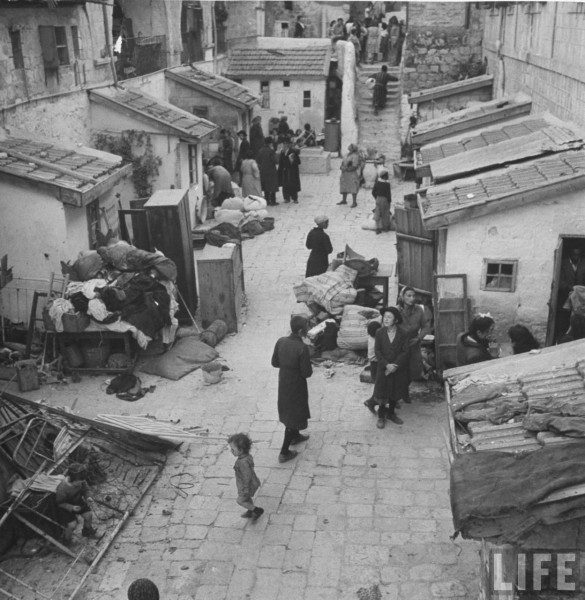
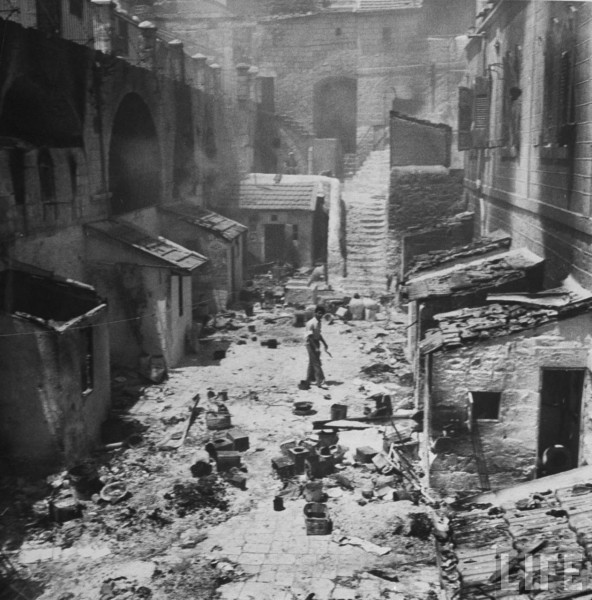

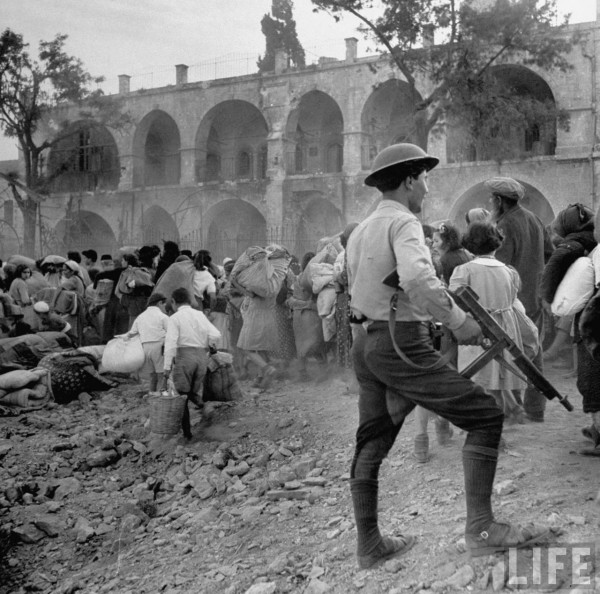
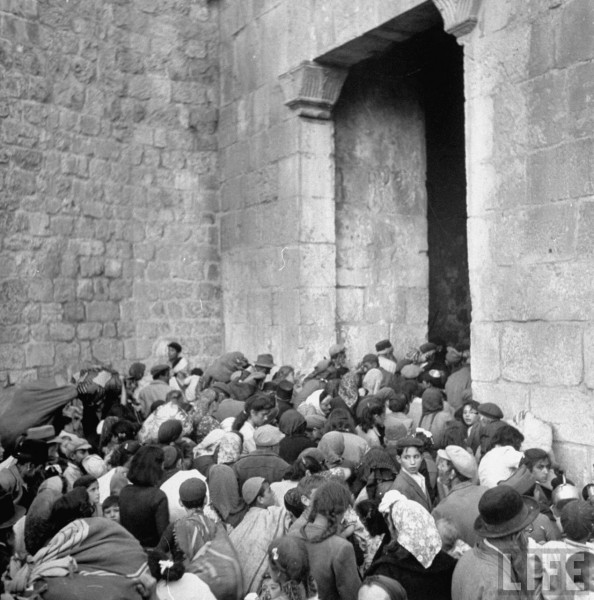
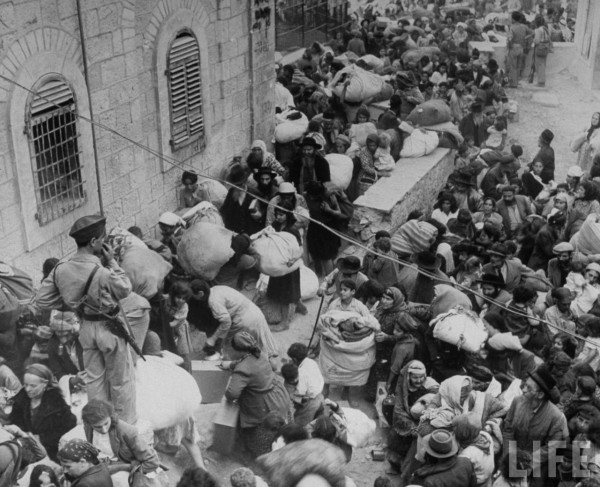 International Red Cross employees helping Jewish refugees. Jerusalem, Israel. June 1948. (Life: John Phillips)
International Red Cross employees helping Jewish refugees. Jerusalem, Israel. June 1948. (Life: John Phillips) 